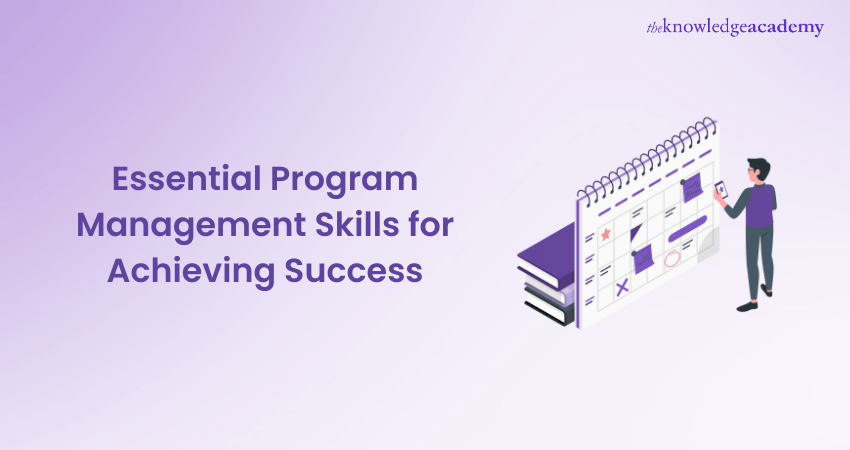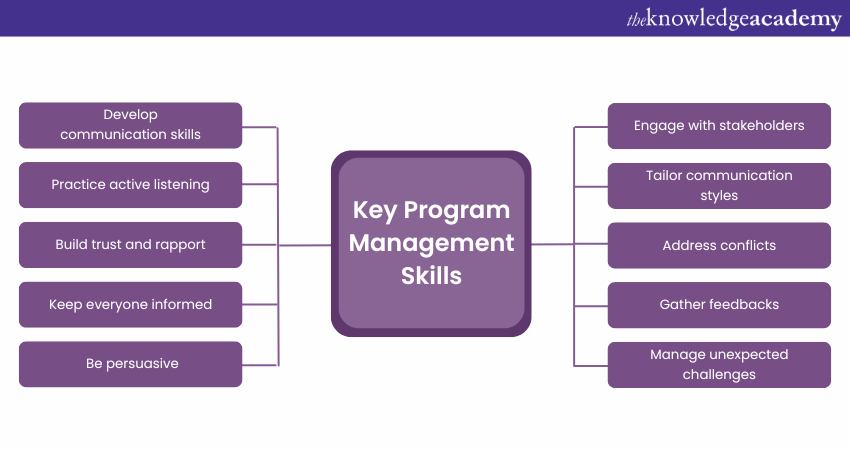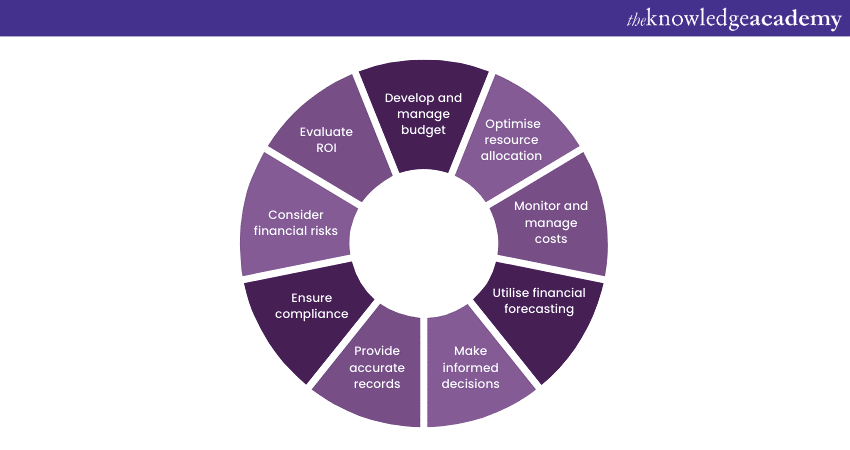We may not have the course you’re looking for. If you enquire or give us a call on +43 720 115337 and speak to our training experts, we may still be able to help with your training requirements.
Training Outcomes Within Your Budget!
We ensure quality, budget-alignment, and timely delivery by our expert instructors.

Program Management requires distinct abilities that surpass traditional Project Management skills. By comprehending and honing Program Management Skills, Program Managers can adeptly navigate intricate challenges and achieve favourable results.
The average salary for a Program Manager in the United Kingdom is £64,201 per year, as per Glassdoor. In this blog, you will learn about key Program Management Skills like communication skills, risk management skills. Continue reading to learn more!
Table of Contents
1) What Are Program Management Skills?
2) Key Program Management Skills
a) Communication and Stakeholder Management
b) Leadership and Team Management
c) Strategic thinking and planning
d) Risk Management
e) Financial Management
f) Change Management
g) Quality Management
h) Problem-solving and decision-making skills
i) Effective persuasion and negotiation skills
3) Conclusion
What are Program Management Skills?
Program Management Skills encompass a diverse range of abilities and competencies that enable Program Managers to effectively lead, plan, execute, and control programs. These skills go beyond traditional Project Management skills and encompass a broader set of capabilities required to manage complex, multi-faceted initiatives.

Key Program Management Skills
From communication to leadership, Program Management involves many important skills and benefits. These skills go beyond traditional Project Management skills and encompass a broader set of capabilities required to manage complex, multi-faceted initiatives. Let's take a look at some of them below:

Communication and Stakeholder Management
Effective communication and stakeholder management are crucial for the success of any program. As a Program Manager, you must excel in these areas to ensure alignment, collaboration, and support from stakeholders. Here are key points to consider:
1) Clear communication: Develop strong communication skills to convey project objectives, expectations, and progress to stakeholders at all levels.
2) Stakeholder engagement: Identify and engage stakeholders, understand their needs, and actively manage their expectations throughout the program.
3) Active listening: Practice active listening to understand stakeholder concerns, address issues, and promote productive dialogue.
4) Adaptability: Tailor communication styles and approaches to different stakeholders, considering their preferences and requirements.
5) Relationship building: Build trust and rapport with stakeholders through effective communication, transparency, and delivering on commitments.
6) Conflict resolution: Address conflicts and disagreements among stakeholders, finding mutually beneficial solutions and maintaining positive relationships.
7) Information dissemination: Ensure timely and relevant information flows to stakeholders, keeping them informed and engaged in the program.
8) Feedback mechanisms: Establish feedback mechanisms to gather stakeholder input, opinions, and suggestions, fostering a sense of inclusion and ownership.
9) Influencing and persuasion: Use persuasive communication techniques to gain stakeholder buy-in, support, and commitment to program objectives.
10) Crisis communication: Develop crisis communication strategies to manage unexpected challenges and maintain stakeholder trust.
Leadership and Team Management
Leadership skills are essential for effective Program Management. As a Program Manager, you must inspire and guide diverse teams towards achieving program goals. Strong leadership fosters a positive work environment, motivates team members, and drives high-performance outcomes.
Effective Team Management is crucial for program success. It involves creating a cohesive team, defining clear roles, and establishing open communication. A skilled Program Manager builds trust, promotes collaboration, and empowers team members to excel.
Program Managers with strong leadership skills set a clear vision, make effective decisions, and provide support to their teams. They manage conflicts, foster innovation, and cultivate a culture of growth.
Drive impactful organisational transformation with our Program Management Professional (PgMP)® Training. Sign up now!
Strategic thinking and planning
In order to excel as a Program Manager, it is crucial to align program objectives with the organisation's broader strategic goals. Strategic Program management enables you to analyse complex problems, identify opportunities, and develop long-term plans for achieving desired outcomes. Here are the key tasks involved in strategic thinking and planning:
1) Setting realistic goals
2) Defining key milestones
3) Outlining the steps required to accomplish milestones
Considering potential risks and challenges, you can develop mitigation strategies to ensure the program's success. Taking a holistic perspective that considers the organisational context and stakeholders' needs is essential. Critical aspects include anticipating changes, adapting to evolving circumstances, and making informed decisions aligned with the organisation's strategic direction.
Risk Management
Effective risk management is crucial for ensuring the success of any program. As a Program Manager, you play a vital role in identifying, assessing, and mitigating risks. Here are key points to consider:
1) Proactive risk identification: Systematically analyse potential risks to anticipate challenges before they escalate.
2) Risk assessment: Evaluate the potential impact of identified risks to prioritise and allocate resources accordingly.
3) Mitigation strategies: Develop strategies to minimise the likelihood or impact of risks, such as contingency plans or risk transfer mechanisms.
4) Ongoing monitoring: Regularly monitor and reassess risks throughout the program lifecycle to remain proactive and responsive.
5) Resource optimisation: Effective Risk Management allows for better resource allocation and the improvement of program progress and efficiency.
6) Contingency planning: Develop contingency plans to mitigate potential disruptions and ensure program continuity.
7) Stakeholder confidence: By prioritising risk management, you instil confidence in stakeholders and enhance decision-making processes.
8) Adaptability to change: Continuously assess and respond to evolving risks, adapting strategies as needed.
9) Desired outcomes: Implementing a comprehensive risk management approach increases the likelihood of achieving program objectives.
By incorporating these risk management practices, Program Managers can safeguard program success, minimise disruptions, and enhance overall program outcomes.
Enhance your expertise in Risk Management and embrace the power of effective risk mitigation for project success with our PMI-RMP® Certification Training!
Financial Management
Effective Financial Management is a critical aspect of a program success. As a Program Manager, you must possess strong financial acumen to optimise resource allocation, control costs, and ensure the program remains within budgetary constraints. Here are key points to consider:

1) Budgeting: Develop and manage the program budget, ensuring adequate resources are allocated to each phase or activity.
2) Resource allocation: Optimise the allocation of financial resources, personnel, and materials to maximise program efficiency.
3) Cost control: Monitor and control costs throughout the program lifecycle, identifying areas for potential savings or efficiencies.
4) Financial forecasting: Utilise financial forecasting techniques to anticipate and plan for future financial needs and challenges.
5) Decision-making: Make informed decisions based on financial analysis, weighing costs, benefits, and risks.
6) Stakeholder reporting: Provide transparent and accurate financial reports to stakeholders, keeping them informed of the program's financial status.
7) Compliance: Ensure compliance with financial regulations, policies, and procedures to maintain transparency and accountability.
8) Financial Risk Management: Consider financial risks and develop strategies to mitigate potential financial challenges or uncertainties.
9) Return on Investment (ROI): Evaluate the financial impact and return on investment of program activities and initiatives.
Change Management
Change Management is a vital component of Program Management, ensuring smooth transitions and successful adoption of new processes or initiatives. As a Program Manager, you must navigate change effectively to minimise resistance and maximise acceptance. Key points to consider:
1) Change readiness: Assess the organisation's readiness for change, including cultural, structural, and operational aspects.
2) Stakeholder engagement: Engage and involve stakeholders throughout the change process, addressing concerns and gaining their support.
3) Communication: Develop a robust communication plan to effectively convey the reasons for change, benefits, and expected outcomes.
4) Change impact analysis: Analyse the potential impact of the change on individuals, teams, and the organisation as a whole.
5) Training and development: Provide necessary training and resources to equip individuals with the skills required to adapt to the change.
6) Monitoring and evaluation: Continuously monitor the change process, gather feedback, and make adjustments as needed.
7) Sustaining change: Develop strategies to embed the change within the organisation's culture and ensure long-term sustainability.
Quality Management
Quality Management plays a pivotal role in ensuring the delivery of exceptional outcomes. It encompasses a set of principles, practices, and techniques aimed at meeting and exceeding stakeholder expectations while adhering to defined standards and requirements.
The key objective of Quality Management is to establish robust processes and procedures that enable the consistent delivery of high-quality deliverables and services. This involves implementing quality control measures, conducting thorough inspections and audits, and continuously monitoring and improving program performance.
Effective Quality Management requires a proactive approach to identify and address potential issues early on, fostering a culture of continuous improvement. It involves engaging stakeholders, understanding their needs and expectations, and aligning program activities to meet those requirements.
Problem-solving and decision-making skills
Program Managers encounter complex challenges that require effective problem-solving and decision-making skills. Here are key elements of problem-solving and decision-making in Program Management:
1) Analysing information: Gathering and evaluating relevant data to gain valuable insights.
2) Identifying alternative solutions: Recognising different approaches and options to address the problem.
3) Evaluating potential outcomes: Assessing the potential results and consequences of each solution.
4) Assessing risks: Identifying and considering the risks and uncertainties associated with each solution.
5) Making well-informed choices: Using a systematic approach to select the most suitable option aligned with program objectives.
6) Thinking critically: Applying logical reasoning and evaluating different perspectives to explore innovative approaches.
7) Acting decisively: Taking prompt and confident action to address problems in a timely manner.
8) Considering stakeholder impact: Recognising the influence and implications of decisions on stakeholders involved.
9) Adapting strategies: Being flexible and adjusting plans based on evolving circumstances and feedback.
10) Leveraging data and evidence: Utilising relevant information and empirical evidence to support decision-making.
11) Embracing creativity: Encouraging a creative mindset to think outside the box and find unique solutions.
Developing strong problem-solving and decision-making skills empowers Program Managers to navigate complexities, overcome challenges, and achieve successful outcomes.
Effective persuasion and negotiation skills
Program Managers often operate in complex environments with multiple stakeholders and competing interests. The ability to influence and negotiate effectively is vital to build consensus, resolve conflicts, and secure necessary resources.
Skilful negotiation ensures that the program's objectives are aligned with organisational priorities and facilitates collaboration among stakeholders.
By developing and honing these key Program Management Skills, you will possess the tools to lead and deliver successful programs. Continual improvement and a commitment to enhancing your skill set will contribute to your effectiveness as a Program Manager and drive positive outcomes for your organisation.
Technical Skills
In the realm of Program Management Skills, technical skills play a vital role in enhancing efficiency, ensuring accuracy, and leveraging technology to drive project success. While Program Managers primarily focus on overseeing the strategic aspects of projects, having a solid grasp of relevant technical skills empowers them to make informed decisions, communicate effectively with technical teams, and troubleshoot issues as they arise.
By developing proficiency in these technical skills, Program Managers can enhance their ability to navigate the complexities of Project Management, leverage technology to streamline processes and drive successful project outcomes in diverse industry settings. Continuously updating and expanding technical knowledge ensures that Program Managers remain adaptable and equipped to meet the evolving demands of the modern business landscape.
Developing Program Management Skills
Continuous learning and development are key to mastering Program Management Skills. Professionals can enhance their proficiency through various means, including formal education, certifications, workshops, and on-the-job experience. Seeking mentorship and networking with peers can also provide valuable insights and guidance.
By embracing a holistic approach to skill development encompassing education, certification, practical experience, mentorship, continuous learning, soft skills development, and resilience, Program Managers can enhance their effectiveness, advance their careers, and drive impactful outcomes in the projects they oversee.
How to enhance your Program Manager Skills
Enhancing your Program Manager skills is key to advancing your career and achieving success in managing complex projects. Here are practical steps to help you strengthen your abilities and excel in your role:
a) Continuous learning: Stay updated on industry trends, best practices, and emerging technologies through reading, attending seminars, and enrolling in relevant courses or certifications.
b) Seek mentorship: Find experienced Program Managers who can offer guidance, share insights, and provide valuable feedback to help you navigate challenges and grow professionally.
c) Gain practical experience: Volunteer for challenging projects or take on leadership roles within your organisation to apply theoretical knowledge in real-world scenarios and develop hands-on expertise.
4) Improve communication skills: Enhance your ability to convey complex ideas clearly and effectively to stakeholders, team members, and executives through practice, feedback, and communication training.
5) Develop leadership qualities: Cultivate leadership traits such as empathy, decisiveness, and adaptability to inspire and motivate teams, resolve conflicts, and drive project success.
Conclusion
We hope you read and understood everything about key Program Management Skills. Mastering them is vital for Program Managers to lead with efficiency and drive successful outcomes. By honing these skills, Program Managers can excel in their roles and achieve program success.
Unlock your potential and elevate your Project Management skills with industry-leading PMP Training. Sign up now!
Frequently Asked Questions

Absolutely, honing Program Management Skills can indeed lead to leadership opportunities within organisations. Program Management is a role that inherently requires strong leadership qualities such as strategic thinking, effective communication, decision-making, and the ability to inspire and motivate teams toward a common goal.

Improving Program Management Skills not only enhances job prospects and salary potential but also opens doors to rewarding career opportunities, professional recognition, and continued growth and advancement in the field.

The Knowledge Academy takes global learning to new heights, offering over 30,000 online courses across 490+ locations in 220 countries. This expansive reach ensures accessibility and convenience for learners worldwide.
Alongside our diverse Online Course Catalogue, encompassing 17 major categories, we go the extra mile by providing a plethora of free educational Online Resources like News updates, Blogs, videos, webinars, and interview questions. Tailoring learning experiences further, professionals can maximise value with customisable Course Bundles of TKA.

The Knowledge Academy offers various PMP® Training, including Program Management Professional (PgMP)® Course, Project Management Professional (PMP)® Certification, Certified Associate in Project Management (CAPM)® Course and Project Management Institute Agile Certified Practitioner (PMI-ACP) ® Training. These courses cater to different skill levels, providing comprehensive insights into What is PMP in Healthcare?
Our Project Management Blogs cover a range of topics, offering valuable resources, best practices, and industry insights. Whether you are a beginner or looking to advance your Program Management skills, The Knowledge Academy's diverse courses and informative blogs have you covered.
Upcoming Project Management Resources Batches & Dates
Date
 PMP® Certification Training Course
PMP® Certification Training Course
Mon 6th Jan 2025
Mon 13th Jan 2025
Mon 20th Jan 2025
Mon 27th Jan 2025
Mon 3rd Feb 2025
Mon 10th Feb 2025
Mon 17th Feb 2025
Mon 24th Feb 2025
Mon 3rd Mar 2025
Mon 10th Mar 2025
Mon 17th Mar 2025
Mon 24th Mar 2025
Mon 31st Mar 2025
Mon 7th Apr 2025
Mon 14th Apr 2025
Tue 22nd Apr 2025
Mon 28th Apr 2025
Tue 6th May 2025
Mon 12th May 2025
Mon 19th May 2025
Tue 27th May 2025
Mon 2nd Jun 2025
Mon 9th Jun 2025
Mon 16th Jun 2025
Mon 23rd Jun 2025
Mon 30th Jun 2025
Mon 7th Jul 2025
Mon 14th Jul 2025
Mon 21st Jul 2025
Mon 28th Jul 2025
Mon 4th Aug 2025
Mon 11th Aug 2025
Mon 18th Aug 2025
Tue 26th Aug 2025
Mon 1st Sep 2025
Mon 8th Sep 2025
Mon 15th Sep 2025
Mon 22nd Sep 2025
Mon 29th Sep 2025
Mon 6th Oct 2025
Mon 13th Oct 2025
Mon 20th Oct 2025
Mon 27th Oct 2025
Mon 3rd Nov 2025
Mon 10th Nov 2025
Mon 17th Nov 2025
Mon 24th Nov 2025
Mon 1st Dec 2025
Mon 8th Dec 2025
Mon 15th Dec 2025







 Top Rated Course
Top Rated Course


 If you wish to make any changes to your course, please
If you wish to make any changes to your course, please


